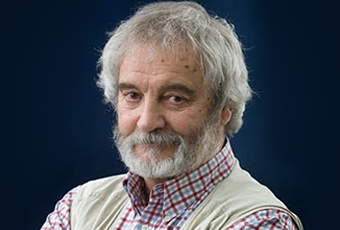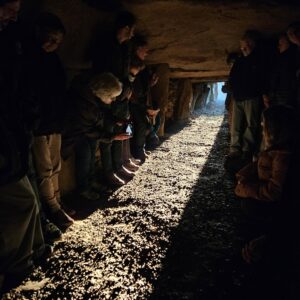
A new book is being published in January by Colin Tudge, author, biologist and contributor to RURAL magazine’s website. His book, The Great Re-think, a 21st Century Renaissance has just been published. Review by ALASDAIR CROSBY
AS a preliminary, may I direct the reader to the ‘What’s for Dinner? section of our website. Once there, it will be easy to find the contribution by Colin Tudge, who delivered a lecture in the ‘What’s for Dinner?’ series and has since contributed a most valuable chapter to our website: see https://www.ruraljersey.co.uk/good-food-for-everyone-forever/
Apart from that, he has written a number of books. He calls himself ‘a biologist by education (Peterhouse, Cambridge) and a writer by inclination and by trade.’ For some decades he worked for World Medicine, Farmers Weekly, New Scientist and the Agricultural and Food Research Council and he had his own science programme on BBC Radio 3 before becoming a full-time author in 1990.
In 2010 he co-founded the Oxford Real Farming Conference; initially a small fringe meeting of the better-known Oxford Farming Conference but which now threatens to overshadow it. In 2021 this is due to become ‘ORFC Global’.
Previous books include titles such as: ‘So shall we Reap: the Concept of Enlightened Agriculture’, ‘Good Food for Everyone Forever –a people’s takeover of the world’s food supply’ and ‘Six Steps back to the Land – why we need small mixed farms and millions more farmers’…. all of which gives a pretty good idea of his interests and the issues that engage him.
These interests and issues he now takes further in ‘The Great Re-Think – a 21st Century Renaissance.’ Quoting from the preface titled: What is and what could be: ‘Even at this late hour, with the world warming and waters rising and popes, scientists and armies of activists queuing up to tell us that we’ll be lucky to survive the present century in a tolerable state, humanity and our fellow creatures will be looking forward to a long and glorious future.
‘Ours is a young species, versatile and genetically various, and our descendants should still be here in a million years’ time – personally fulfilled, at peace and in the company of wild creatures of wondrous diversity and in great abundance.’
It sounds quite a big step from here to there and the signs are that we won’t have a million years preparation in front of us to achieve it. To get there and to beat the wolves of ecological catastrophe and cataclysm that sometimes seem to be chasing at our heels, require, in his words, a re-think and a re-structuring that amount to nothing less than a Renaissance. Not like the first renaissance that ended the Middle Ages, which was led ‘from top down’, but one brought about by people at large.
He admits it is a tall order, but many millions of people of individuals and organisations worldwide are already showing the way, ‘What’s needed now is co-ordination, underpinned by a coherent philosophy.’
He continues: ‘This book does not presume to provide sure-fire formulae; it does aspire to point the necessary discussions in the right direction.’
Chapter headings include The Nature of the Task; the Goal; Action; etc. There are chapters on ‘An economy fit for purpose’ and ‘Metaphysics: the essential ingredient that’s gone missing.’
An attractive element of the book is that it is written in an easy way for the non-academic or non-specialist philosopher; a reader might well quail at reading about metaphysics, for example, but the thought process is easy to follow as well as being attractive.
The thought processes in fact, are easier to follow than the small print of the book, which does the theme a disservice. But that aside, it is a valuable and important book for anyone who likes the prospect of ‘convivial societies in a flourishing biosphere.’
Is Colin just a dreamer and does this have any practical relevance to the world we are in? Well, so were the Old Testament Prophets, many of whom were ridiculed in their day. ‘The Great Re-Think’ is also a prophecy of what might be, if only we choose to listen and an important addition to the corpus of Distributist thought.
The book is highly commended to anyone wanting a thoughtful read this season of home lockdown and reflection.
The Great Re-Think is due to be published on 7 January. It can be ordered through Waterstones or Amazon.




